Key takeaways:
- Breeding ethics require a commitment to the health and welfare of animals, prioritizing responsible practices over profit or prestige.
- Responsible breeding is essential for preventing genetic disorders, maintaining breed standards, and providing education to potential pet owners.
- The future of breeding ethics will be shaped by advancements in genetic technology and the integration of community perspectives, emphasizing a holistic view of animal welfare.
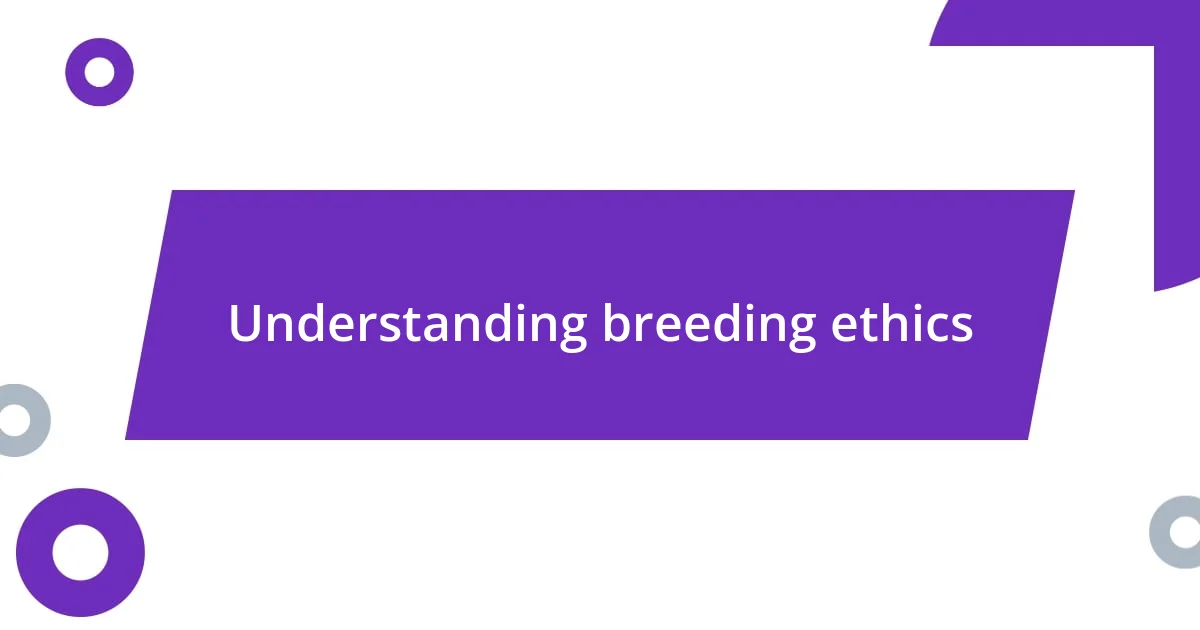
Understanding breeding ethics
Breeding ethics is a deeply personal and often complex topic. I’ve seen many breeders who genuinely love animals, yet they sometimes overlook the responsibilities that accompany their passion. For instance, I recall a conversation with a breeder who proudly showcased their latest litter, but when I asked about health testing, their hesitation spoke volumes. Shouldn’t the welfare of each animal always come first?
Contemplating breeding ethics often brings me back to the idea of consent—something humans cherish but animals cannot articulate. It’s a tough reality. I remember a time when I fostered a rescue dog; seeing her develop from frightened to confident changed my perspective entirely. Isn’t it our duty to ensure that all breeding practices prioritize the emotional and physical well-being of animals involved?
As I dive deeper into this subject, I can’t help but question what drives breeders to make certain choices. Are they motivated by profit, prestige, or a genuine desire to improve breeds? I believe that being transparent about one’s breeding practices is vital. Reflecting on my experiences, I’ve recognized that ethical breeding fosters stronger relationships between breeders and pet owners, leading to happier, healthier pets.
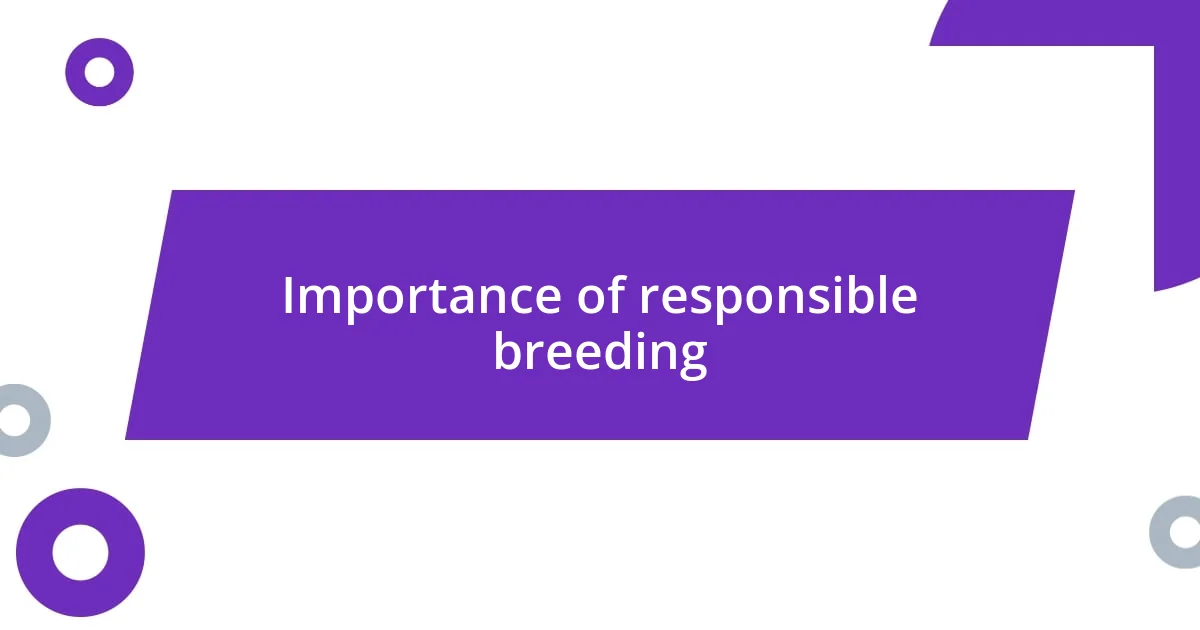
Importance of responsible breeding
Responsible breeding is crucial for several reasons. Firstly, it ensures the health and well-being of both the animals and the future owners. I remember a time volunteering at a shelter where many dogs were neglected, often due to irresponsible breeding practices. It was heart-wrenching to see these innocent animals suffer because someone prioritized profit over care.
Additionally, responsible breeding plays a significant role in maintaining breed standards and preventing genetic disorders. I’ve encountered numerous pet owners with pets who had debilitating health issues stemming from poor breeding choices. This reinforces my belief that ethical practices not only strengthen breeds but also contribute to the happiness and longevity of the animals involved. Why risk the joy of companionship with a pet that has serious health challenges?
Lastly, breeders have a social responsibility to educate potential owners about the specific needs and traits of the breeds they produce. I learned this firsthand when a friend impulsively bought a bred puppy without understanding the breed’s history. It was a learning moment that highlighted the importance of responsible breeding not only in terms of the animals but also for the well-being of the community.
| Aspect | Responsible Breeding | Irresponsible Breeding |
|---|---|---|
| Health of Animals | Prioritizes health testing and genetic screening | Neglects these important tests, leading to health issues |
| Breed Standards | Maintains and improves breed characteristics | Potentially harms breed integrity |
| Owner Education | Educates owners about breeds and responsibilities | Fails to inform, leading to mismatched expectations |
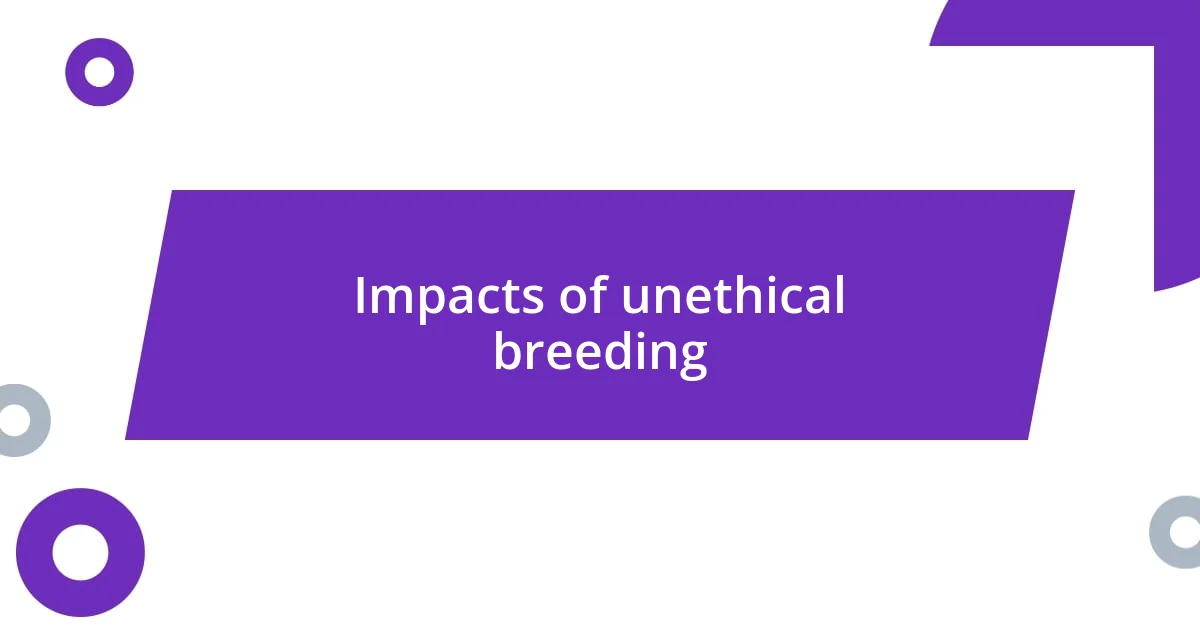
Impacts of unethical breeding
It’s jarring to see the consequences of unethical breeding. I remember visiting a local shelter and meeting a dog with severe hip dysplasia, a painful condition that often results from poor breeding practices. The moment I realized this pup’s suffering stemmed from someone’s negligence left me feeling frustrated and sad. It’s a stark reminder that, when breeders cut corners, animals can pay the price in the worst possible ways.
The impacts of unethical breeding extend beyond individual animals. They create a ripple effect that influences entire breeds and communities. Here are some of the most significant effects I’ve observed:
- Health Issues: Animals bred without rigorous health testing face higher risks of genetic disorders, leading to suffering and early mortality.
- Lifespan Reduction: Poor breeding practices can significantly decrease a breed’s average lifespan, making what should be a joyous companionship tragically short-lived.
- Overpopulation: Irresponsible breeding often contributes to an increase in unwanted animals, filling shelters and placing a strain on resources.
- Emotional Toll: The psychological impact on pet owners who face the heartache of managing their pet’s chronic health issues can be profound and lasting.
Reflecting on these impacts drives home the need for ethical considerations. I often think about not just the puppies but the countless lives that can be changed for the better—or worse—by the choices breeders make.
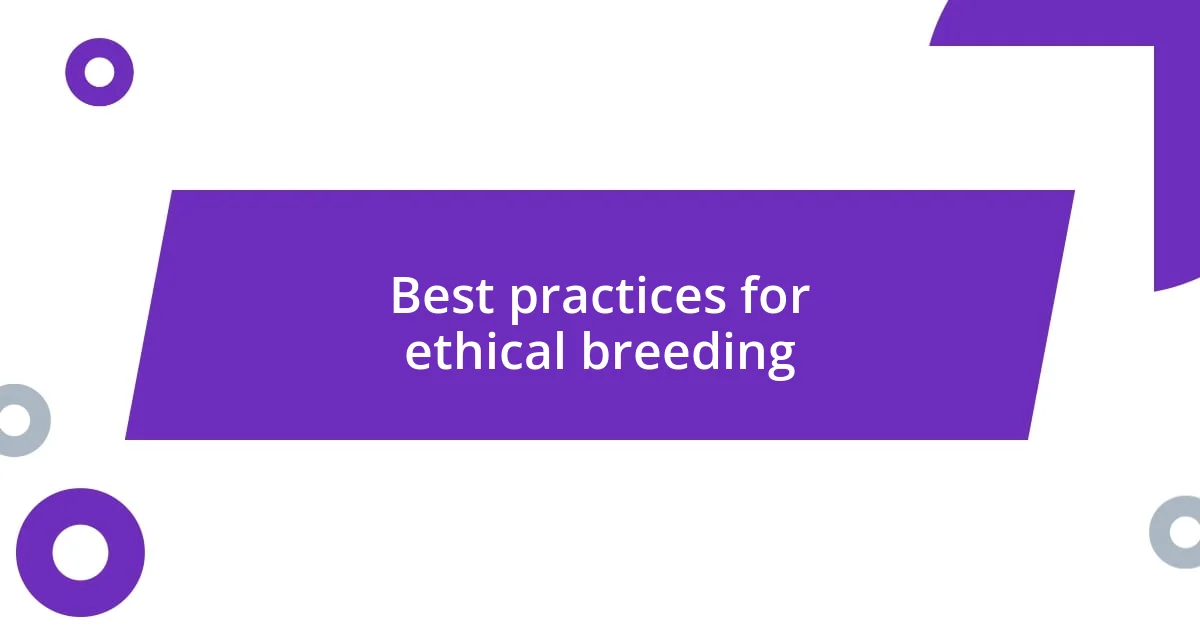
Best practices for ethical breeding
When it comes to ethical breeding, prioritizing health testing is non-negotiable. I vividly recall a friend who bred her dogs without conducting any health screenings, only to later discover her litters were plagued by unexpected health issues. It made me wonder—how many potential heartaches and vet bills could have been avoided with just a bit of foresight? It’s a stark reminder that the initial investment in health can save both breeders and future owners a significant emotional and financial burden.
Another vital aspect of best practices in breeding is educating prospective pet owners. I once chatted with a couple who were thrilled about bringing home a designer breed, but they had no idea about the specific grooming needs or health considerations associated with it. Their excitement quickly turned into anxiety when they faced unforeseen challenges, and it left me questioning—how much better could their experience have been if they had the right information upfront? This kind of education not only prepares owners but also fosters a strong bond and understanding between them and their new pets.
Lastly, maintaining a responsible breeding environment is essential. I visited a facility that was a model of ethical practices, where cleanliness, proper socialization, and a comfortable space were prioritized. It felt so rewarding to see how these simple elements contributed to the health and happiness of the animals. It led me to reflect on how our choices reflect our values. Are we ensuring that our breeding practices are a reflection of care, compassion, and commitment to the well-being of animals? The answer to this question could shape the future of breeding ethics for generations to come.
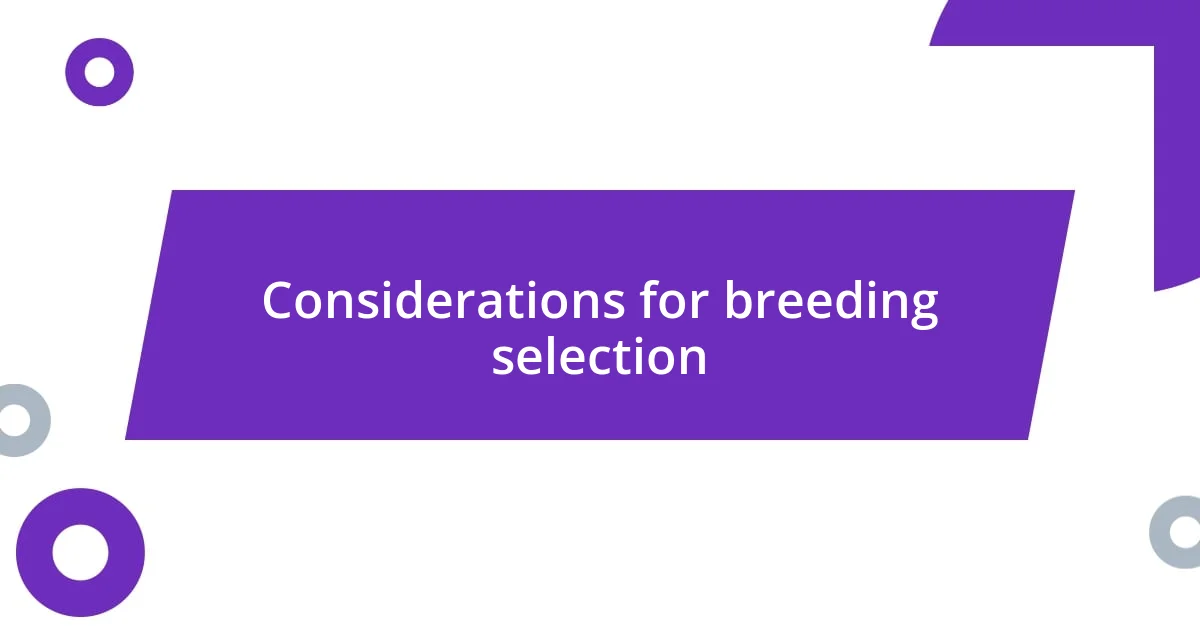
Considerations for breeding selection
Choosing the right breeding selections isn’t just a box to tick; it’s a profound responsibility. I recall when I met a breeder who swore by her method of selecting mates based solely on appearance. It baffled me to think that something as critical as genetics could be overshadowed by aesthetics. I often ask myself: how many exceptional animals go unseen when we prioritize looks over sound health and temperamental compatibility?
In my experience, understanding lineage plays a pivotal role in breeding decisions. I remember chatting with a breeder who meticulously researched the ancestral health histories of her dogs. She shared stories about how this practice not only led to healthier pups but also fostered a stronger community of knowledgeable breeders. It made me wonder: wouldn’t the entire breeding landscape benefit if we all took the time to dig deeper into the family tree of our animals? This commitment to transparency can illuminate potential risks and reinforce ethical standards.
Moreover, I find that recognizing the temperament of both parent animals is often overlooked yet crucial. I once witnessed a beautiful litter born to a couple whose personalities clashed drastically. The puppies, while stunning, developed behavioral issues that could have been nurtured differently with thoughtful pairings. It leaves me pondering: aren’t we doing a disservice to our future pets if we ignore their emotional inheritances? Ethical breeding must encompass not only genetics but also the personalities involved, shaping not just the bodies but the hearts of the animals we bring into the world.
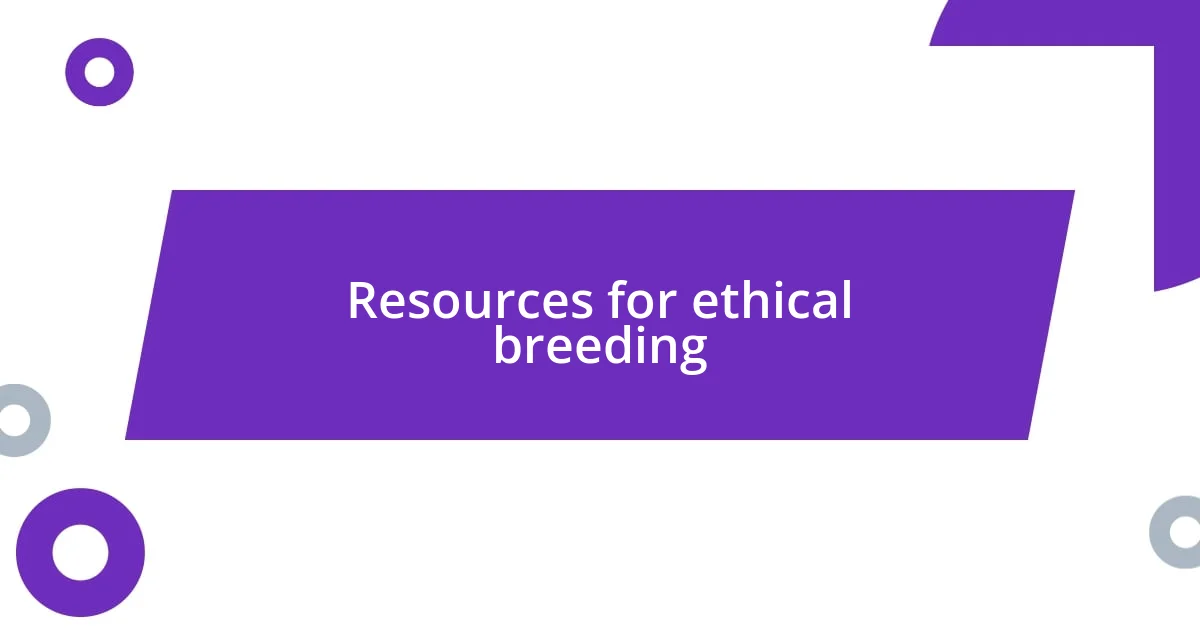
Resources for ethical breeding
Naturally, ethical breeding requires a solid foundation of resources, and one of the most informative places to start is through reputable breeder associations. I’ve often turned to organizations like the American Kennel Club (AKC) and the Canadian Kennel Club (CKC), which provide extensive guidelines and standards for ethical practices. Their resources not only clarify health testing requirements but also offer educational materials for both breeders and aspiring pet owners, ensuring everyone is on the same page about what it truly means to breed responsibly.
Additionally, I’ve found that tapping into online forums and communities can be incredibly insightful. I remember joining a breeder group on social media, where members openly shared experiences, challenges, and successes in ethical breeding. It was refreshing to witness such camaraderie and support; those conversations have profoundly deepened my understanding of responsible practices. How often do we underestimate the power of shared knowledge? Engaging with like-minded individuals can amplify our commitment to ethics in breeding.
Lastly, I strongly advocate for attending breeding conferences and workshops. I recall attending a local event where seasoned breeders shared invaluable lessons from their own journeys. It’s a space where questions are encouraged and wisdom flows freely. The connections I made and the insights I gathered were not just academic; they sparked a continual urge to improve my own practices. Isn’t it remarkable how immersive experiences can shape our perspectives and refine our approaches to ethical breeding? Investing in these resources creates a ripple effect, nurturing a community that values integrity and care for animals.
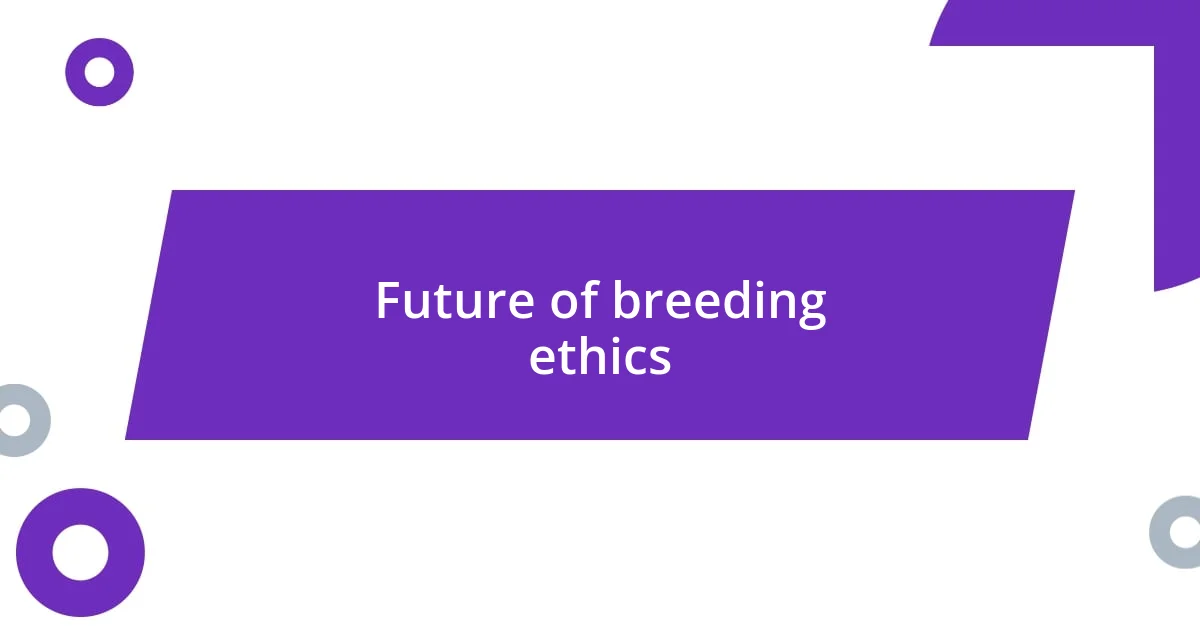
Future of breeding ethics
Looking ahead, the future of breeding ethics is likely to become increasingly influenced by advancements in genetic research and technology. I remember attending a seminar where a geneticist discussed the potential of CRISPR technology in breeding. The possibilities excited me, but I also wondered: how do we navigate the moral implications of using such powerful tools? The line between responsible innovation and ethical concerns will be essential as we strive to enhance animal welfare while respecting nature’s boundaries.
Another aspect that’s becoming clearer to me is the importance of community engagement in shaping breeding practices. During a local breeders’ meeting, I was struck by how different perspectives led to passionate discussions about ethical responsibilities. It made me realize that integrating varied voices—from breeders to pet owners—can elevate our standards. As we move forward, shouldn’t we prioritize inclusive conversations that bring more awareness to the issues at hand? Building a collective understanding is crucial for fostering an environment where ethics can thrive.
I can’t help but feel a growing responsibility for future generations of breeders to embrace a holistic view of animal welfare. While working in animal rescue, I often encountered breeds that suffered due to poor breeding choices. Each story reinforced my belief that breeding is about more than just producing animals; it’s about creating a legacy of health, happiness, and harmony. How can we pave the way for a future where ethics are at the forefront of breeding decisions? Perhaps by nurturing compassion and knowledge in our practices, we can inspire a new era of ethical breeding that truly serves the animals and their future families.














